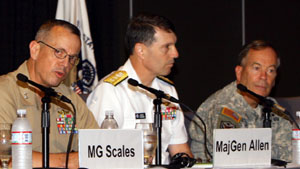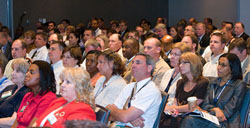How Do the Services Ensure They Are Dominant - Relevant - Ready in the Joint Domain?
 Members of the first panel of the morning presented their own service views about dominance, relevance and readiness in the joint domain. Several common themes emerged as areas that are challenging to each of the armed forces as well as the Coast Guard.
Members of the first panel of the morning presented their own service views about dominance, relevance and readiness in the joint domain. Several common themes emerged as areas that are challenging to each of the armed forces as well as the Coast Guard.
All of the military leaders agreed that the level of complexity has increased significantly since the terrorist attacks of 9/11 and operations began in the Global War on Terrorism. Offering one example of the increase in complexity, Maj. Gen. David A. Fastabend, USA, director of strategy, plans and policy, G-3/5/7, U.S. Army, asked the audience to imagine soldiers today who must work their way through a marketplace to carry out a mission. Fighting war among the resident population increases the clutter that challenges both soldiers and leadership. But, he added, the level of complexity also has increased as the military finds itself needing to work with a number of nonmilitary organizations to accomplish a mission. Like it or not, this means that members of agencies such as the U.S. Department of State have become contributors of military missions.
Achieving balance in the services also has become more difficult over time. Gen. Fastabend offered that the military must shift to balance its capabilities to meet a wide range of challenges. Maj. Gen. John Allen, USMC, noted that one of the key issues that requires balancing in this arena is the strain that new environments and adversarial tactics place on intellectual capital. "For us the challenge of irregular warfare is that it is intellectually demanding business. If you don't understand the human drain in the operations you're involved with, you are simply going to be surprised all of the time," Gen. Allen said.
 Panelists agreed that among the biggest challenges is the persistent nature of today's conflict. Unlike past wars when battles may have occurred simultaneously but in specific locations with a set beginning and end, today's warfighters-who sometimes find themselves returning to Iraq for three and even four tours-must be ready to accept that this war is ongoing and a dynamism exists that did not exist in conflicts in the past. In addition, military leaders must accept this fact as well and must design their strategies to reflect this change, the panelists concurred.
Panelists agreed that among the biggest challenges is the persistent nature of today's conflict. Unlike past wars when battles may have occurred simultaneously but in specific locations with a set beginning and end, today's warfighters-who sometimes find themselves returning to Iraq for three and even four tours-must be ready to accept that this war is ongoing and a dynamism exists that did not exist in conflicts in the past. In addition, military leaders must accept this fact as well and must design their strategies to reflect this change, the panelists concurred.
Finally, a number of lessons learned from current operations point to the fact that current, and most likely future conflicts, require a human approach. "War is fundamentally a human endeavor as much as a technical challenge," said Maj. Gen. Robert Scales Jr., USA (Ret.), former commandant, U.S. Army War College. From appreciating and taking advantage of young warfighters' talent with new technologies to accepting that one attack on a mosque can reopen old wounds and create new hostilities, military leaders must realize that at the end of the day, war is about more than the networks that connect people; it's about the people themselves.
Listen to the complete panel here (mp3 link):
Panel session: How Do the Services Ensure They are Dominant - Relevant - Ready in the Joint Domain?




Comments